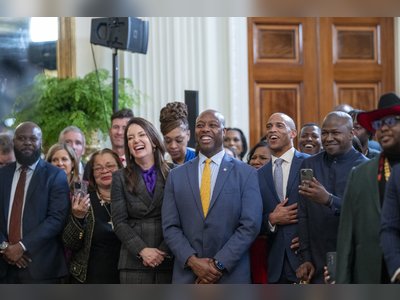White HouseSenateThe HouseSupreme CourtFederal ReserveDOJState DepartmentTreasuryCensusBudget OfficeTrade Representative
WashingTone
Informed by Washington, Defined by Insight
Monday, Mar 02, 2026
WashingTone

U.S. Department of the Treasury Policy Brief Highlights Challenges and Opportunities in Small Business Financing
The Treasury's new policy brief addresses trends in small business financing, the role of emerging technologies, and recommendations for improving access to capital for underserved businesses.
On January 10, 2025, the U.S. Department of the Treasury released a comprehensive policy brief titled Financing Small Business: Landscape and Recommendations.
This document offers a detailed overview of the evolving small business financing landscape, taking into account the rapid growth of non-bank financial technology (fintech) providers and the increasing role of artificial intelligence (AI) in shaping access to capital.
Building on feedback from a roundtable hosted by the Office of Financial Institutions Policy in September 2024, the brief seeks to address both the progress and ongoing challenges in small business financing.
A Changing Landscape: The Role of Technology and Fintech in Small Business Financing
Over the last decade, small businesses have faced a significant transformation in how they access capital.
Traditionally, small businesses relied heavily on loans from large banks, credit unions, and community banks.
However, recent trends show that access to credit from traditional banks has become more constrained, with large banks tightening credit standards and originating fewer loans to small businesses.
This shift has left many small business owners seeking alternatives.
In response to these constraints, fintech companies have stepped in to fill the gap.
These non-bank lenders have grown significantly, offering an array of financing products that include loans, merchant cash advances, and factoring.
According to the Treasury's policy brief, fintechs have originated a larger share of small business loans, providing a much-needed avenue for businesses that may not meet the criteria set by traditional banks.
However, while fintechs have been praised for expanding access to capital, they have also raised concerns related to transparency, fees, and the terms of loans.
Many small business owners have expressed difficulty in navigating the complex landscape of financial products, especially those with variable repayment terms, fluctuating interest rates, and opaque fees.
The Treasury report points out that a lack of clear, standardized disclosures and comparison tools contributes to a less competitive and more fragmented market, leaving businesses to make financing decisions without a full understanding of the potential costs involved.
Barriers to Financing: Challenges Faced by Small Business Owners
While the growth of fintechs has expanded options for many, small businesses, particularly those from underserved communities, continue to face significant challenges in securing financing.
The Treasury report highlights the unique obstacles that these business owners face, including limited access to capital sources, a lack of personal resources, and cultural barriers that hinder trust in financial institutions.
Community banks and mission-driven lenders, such as Community Development Financial Institutions (CDFIs), have played a pivotal role in providing capital to underserved populations.
These institutions have made a tangible impact, particularly in rural and low-income areas, by offering more tailored and accessible financing options.
However, the report notes that even these critical lenders may not be able to fill all the gaps in capital access, especially in communities that continue to be left behind by traditional and non-traditional financing sources alike.
Moreover, emerging businesses, particularly those owned by minorities and women, report facing difficulties in obtaining financing due to these systemic barriers.
This inequality in access to capital has been compounded by the economic disruptions caused by the pandemic, which disproportionately affected small businesses owned by people of color and women.
Policy Recommendations: Addressing Gaps and Improving Access to Capital
The Treasury brief emphasizes the importance of continued collaboration between policymakers, financial institutions, and small business owners to address the ongoing challenges in the financing market.
Several key recommendations are presented to improve access to capital and create a more inclusive and transparent financial system for small businesses.
Engagement with Stakeholders: Policymakers should continue engaging with industry stakeholders, including fintechs, community banks, and small business owners, to evaluate the effectiveness of current financing options and identify further opportunities to expand access to capital.
These conversations should be centered around understanding the gaps in capital access and finding solutions that address the unique needs of underserved businesses.
Standardized Disclosures and Transparency: One of the most pressing recommendations is for capital providers to consider developing more uniform disclosures for financial products.
This includes providing clearer, more understandable information about repayment terms, fees, and interest rates, which would enable businesses to make more informed financing decisions.
Uniform product disclosures would also encourage competition and drive better practices across the industry.
Leveraging Government Programs: The brief encourages capital providers to leverage government programs, such as those offered by the Small Business Administration (SBA), to deepen small business access to capital.
While government-backed loans can help mitigate the risks associated with lending to small businesses, careful risk management standards must be maintained to ensure the sustainability of these programs.
Coordination Across Agencies: To foster a more robust financial system, the brief recommends that financial regulators, including the Treasury Department, continue to coordinate with other government agencies.
This would involve developing coordinated resources to assist small business owners and ensuring that emerging technologies like AI are regulated consistently and fairly.
Given the growing role of AI in financial decision-making, policymakers must ensure that standards are in place to promote fairness, transparency, and equity.
The Role of Artificial Intelligence in Small Business Financing
One of the most notable changes in the small business financing landscape is the growing role of artificial intelligence.
AI and machine learning technologies are increasingly being deployed by fintech companies to streamline the lending process, assess creditworthiness, and improve the overall efficiency of financial services.
While these technologies hold promise for improving access to financing, they also raise concerns about fairness and bias in decision-making.
Small businesses, particularly those from marginalized communities, may be disproportionately affected by biased algorithms that fail to account for non-traditional business practices or economic circumstances.
Policymakers are advised to work closely with financial institutions to develop robust AI standards that ensure fairness, transparency, and accountability.
It will be critical to ensure that AI technologies used in lending do not exacerbate existing disparities or create new barriers for business owners seeking access to capital.
Conclusion: A Path Toward a More Inclusive Small Business Financing System
The U.S. Treasury Department's policy brief underscores the evolving nature of small business financing in the U.S. and highlights both the progress made and the challenges that remain.
As fintechs continue to expand their role in the market, and as new technologies like AI reshape the financial landscape, the need for clear, transparent, and equitable access to capital has never been more critical.
By addressing the barriers faced by underserved business owners and fostering collaboration between policymakers, financial institutions, and small business owners, the U.S. can build a more inclusive and robust financing system that supports the growth and success of small businesses across the nation.
This document offers a detailed overview of the evolving small business financing landscape, taking into account the rapid growth of non-bank financial technology (fintech) providers and the increasing role of artificial intelligence (AI) in shaping access to capital.
Building on feedback from a roundtable hosted by the Office of Financial Institutions Policy in September 2024, the brief seeks to address both the progress and ongoing challenges in small business financing.
A Changing Landscape: The Role of Technology and Fintech in Small Business Financing
Over the last decade, small businesses have faced a significant transformation in how they access capital.
Traditionally, small businesses relied heavily on loans from large banks, credit unions, and community banks.
However, recent trends show that access to credit from traditional banks has become more constrained, with large banks tightening credit standards and originating fewer loans to small businesses.
This shift has left many small business owners seeking alternatives.
In response to these constraints, fintech companies have stepped in to fill the gap.
These non-bank lenders have grown significantly, offering an array of financing products that include loans, merchant cash advances, and factoring.
According to the Treasury's policy brief, fintechs have originated a larger share of small business loans, providing a much-needed avenue for businesses that may not meet the criteria set by traditional banks.
However, while fintechs have been praised for expanding access to capital, they have also raised concerns related to transparency, fees, and the terms of loans.
Many small business owners have expressed difficulty in navigating the complex landscape of financial products, especially those with variable repayment terms, fluctuating interest rates, and opaque fees.
The Treasury report points out that a lack of clear, standardized disclosures and comparison tools contributes to a less competitive and more fragmented market, leaving businesses to make financing decisions without a full understanding of the potential costs involved.
Barriers to Financing: Challenges Faced by Small Business Owners
While the growth of fintechs has expanded options for many, small businesses, particularly those from underserved communities, continue to face significant challenges in securing financing.
The Treasury report highlights the unique obstacles that these business owners face, including limited access to capital sources, a lack of personal resources, and cultural barriers that hinder trust in financial institutions.
Community banks and mission-driven lenders, such as Community Development Financial Institutions (CDFIs), have played a pivotal role in providing capital to underserved populations.
These institutions have made a tangible impact, particularly in rural and low-income areas, by offering more tailored and accessible financing options.
However, the report notes that even these critical lenders may not be able to fill all the gaps in capital access, especially in communities that continue to be left behind by traditional and non-traditional financing sources alike.
Moreover, emerging businesses, particularly those owned by minorities and women, report facing difficulties in obtaining financing due to these systemic barriers.
This inequality in access to capital has been compounded by the economic disruptions caused by the pandemic, which disproportionately affected small businesses owned by people of color and women.
Policy Recommendations: Addressing Gaps and Improving Access to Capital
The Treasury brief emphasizes the importance of continued collaboration between policymakers, financial institutions, and small business owners to address the ongoing challenges in the financing market.
Several key recommendations are presented to improve access to capital and create a more inclusive and transparent financial system for small businesses.
Engagement with Stakeholders: Policymakers should continue engaging with industry stakeholders, including fintechs, community banks, and small business owners, to evaluate the effectiveness of current financing options and identify further opportunities to expand access to capital.
These conversations should be centered around understanding the gaps in capital access and finding solutions that address the unique needs of underserved businesses.
Standardized Disclosures and Transparency: One of the most pressing recommendations is for capital providers to consider developing more uniform disclosures for financial products.
This includes providing clearer, more understandable information about repayment terms, fees, and interest rates, which would enable businesses to make more informed financing decisions.
Uniform product disclosures would also encourage competition and drive better practices across the industry.
Leveraging Government Programs: The brief encourages capital providers to leverage government programs, such as those offered by the Small Business Administration (SBA), to deepen small business access to capital.
While government-backed loans can help mitigate the risks associated with lending to small businesses, careful risk management standards must be maintained to ensure the sustainability of these programs.
Coordination Across Agencies: To foster a more robust financial system, the brief recommends that financial regulators, including the Treasury Department, continue to coordinate with other government agencies.
This would involve developing coordinated resources to assist small business owners and ensuring that emerging technologies like AI are regulated consistently and fairly.
Given the growing role of AI in financial decision-making, policymakers must ensure that standards are in place to promote fairness, transparency, and equity.
The Role of Artificial Intelligence in Small Business Financing
One of the most notable changes in the small business financing landscape is the growing role of artificial intelligence.
AI and machine learning technologies are increasingly being deployed by fintech companies to streamline the lending process, assess creditworthiness, and improve the overall efficiency of financial services.
While these technologies hold promise for improving access to financing, they also raise concerns about fairness and bias in decision-making.
Small businesses, particularly those from marginalized communities, may be disproportionately affected by biased algorithms that fail to account for non-traditional business practices or economic circumstances.
Policymakers are advised to work closely with financial institutions to develop robust AI standards that ensure fairness, transparency, and accountability.
It will be critical to ensure that AI technologies used in lending do not exacerbate existing disparities or create new barriers for business owners seeking access to capital.
Conclusion: A Path Toward a More Inclusive Small Business Financing System
The U.S. Treasury Department's policy brief underscores the evolving nature of small business financing in the U.S. and highlights both the progress made and the challenges that remain.
As fintechs continue to expand their role in the market, and as new technologies like AI reshape the financial landscape, the need for clear, transparent, and equitable access to capital has never been more critical.
By addressing the barriers faced by underserved business owners and fostering collaboration between policymakers, financial institutions, and small business owners, the U.S. can build a more inclusive and robust financing system that supports the growth and success of small businesses across the nation.











